 Home > Commentary and Features
Home > Commentary and Features Welcome To Nerd Vegas: A Guide To Visiting Comic-Con International 2011 (The Placeholder Edition)
posted September 6, 2010
Welcome To Nerd Vegas: A Guide To Visiting Comic-Con International 2011 (The Placeholder Edition)
posted September 6, 2010

 Comic-Con International
Comic-Con International, also known as CCI, Comic-Con and San Diego Con, is the largest gathering of comics industry professionals and fans in North America. It is a show of great importance to hundreds of pros in related publishing, merchandising and film businesses.
In 2011, the show is scheduled for July 21-24, with a
preview night on July 20.
What follows is a short list of observations related to early-in-the-cycle issues that will hopefully prepare you in a timely fashion for your San Diego con-going experience next summer. This post will be at the top of this section for the remainder of the Fall and Winter and then supplanted by a brand new, full guide on Memorial Day 2011 (May 30).
For more information, a fuller idea of what you may be getting yourself into, and a lot of not-always-successful jokes, go to last year's full guide.
*****
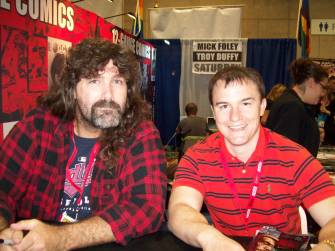 Why Should I Attend Comic-Con International?
Why Should I Attend Comic-Con International?
Comic-Con International has become a crossroads meeting ground for all of North American pop culture entertainment. It offers a massive main floor shopping experience; sophisticated programming ranging from premiere movie trailers with stars in tow to comics how-to sessions; an exuberant social experience in the cradle of San Diego's high-end downtown hotel, bar and restaurant district; and the potential for quality face time and professional networking opportunities in comics and a dozen related entertainment industries. It is the biggest public event in the North American comics industry calendar year, and an increasingly important weekend for the film, television, toy-making and prose publishing industries.
For an idea of the range of experiences available to con-goers,
start here.
****
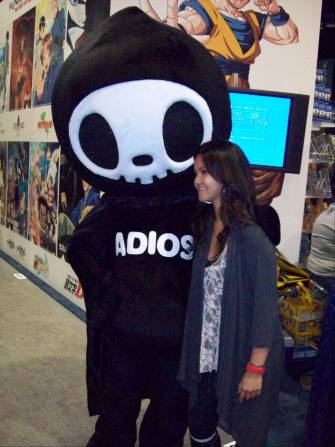 Why Should I Not Attend Comic-Con International?
Why Should I Not Attend Comic-Con International?
Comic-Con International can be expensive, difficult and exhausting. The flush of new attendees over the last half-dozen years has made it harder than ever to secure a hotel room and, once there at the show itself, to see all of the events on the convention floor and in the programming halls that one might conceivably wish to see. While the convention continues to offer unique shopping opportunities, the chances you and I can find the bulk of what we want to enjoy our hobbies outside of convention-floor shopping has increased in
exponential fashion over the last 20 years. If you have a
specific interest, say a single property or individual creator or sub-set of artistic expression, there are smaller conventions that might be tailored to your focused agenda and thus better serve your needs. If you just want to look at a few comics and meet some cartoonists, you may be able to do that at one of the great regional conventions that have popped up around the country without the cost and stress of going to San Diego. It's always worth mentioning that the basic convention experience -- wherever it's offered -- simply isn't for everyone. For every person that comes face to face with a crush of people in costumes and folks trying to sell them things and lines to get into rooms to hear people talk and thinks it's heaven on earth, there is another person for whom all of that is closer to hell.
*****
 What Questions Should I Ask Myself Before I Commit Either Way?
1. "Do I Really, Really Want to Go?"
What Questions Should I Ask Myself Before I Commit Either Way?
1. "Do I Really, Really Want to Go?"
Again: If it feels like it will be a chore in any way, don't go. It's not a requirement. If you're connected in any way to people that are going, or a fan of something receiving special consideration at a specific year's show, you may feel a twinge of regret caused by being left out, but that feeling goes away
really quickly.
2. "Do I Need to Be There the Whole Weekend?"
I almost never go the full length of the show. Greatest benefit?
There's no better way to reduce the costs of a convention than to cut the time spent there. Second greatest benefit? It's much more likely you'll leave wanting more.
3. "Do I Need a Room or Just a Bed?"
Figure out exactly what you need at all stages of your trip and what you're willing to accept. For instance, in terms of where you stay, a bed may be easier to find than a room. A room anywhere in town will be easier to find than a room right next to the convention center. A series of rooms for a bunch of your family members is going to be more difficult to track down than one room for yourself. And so on.
4. "Do I Want to Go for Realistic Reasons?"
A comic book convention is not a young-woman-with-her-first-job-in-the-big-city movie. If it were, there are way more of us playing the wacky supporting character role than the lead.
Go for the experience you're likely to have, not the experience you think you deserve. Also: there's always a chance that if you target one type of entertainment, one creator or property, one thing you want to do at the show, that person or film/book/comic might not be represented at the show that year.
*****
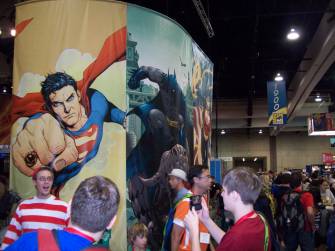 What Was 2010 Like That Should Indicate Some Of What Might Be In Store For 2011?
What Was 2010 Like That Should Indicate Some Of What Might Be In Store For 2011?
The economy was slightly less of a general concern going into the 2010 show as opposed to the tremendous shadow it cast over the 2009 version, but many folks were still budget-conscious in how they approached Comic-Con and what they purchased there. The biggest story, oddly, was
the 2013 Comic-Con and where it will be held. After long and drawn-out negotiations that were watch-for-it news for months, the choice facing Comic-Con was believed to be down to a final threesome of San Diego, Anaheim and Los Angeles. That the convention tabled further discussion until after the show didn't keep people from talking about it, almost incessantly. San Diego eventually won.
Something similar to 2009 that was true of 2010 is that this year's Comic-Con was a very
packed show. There was the first act of significant violence in one of the big halls believed -- although I'm not entirely sure this was ever confirmed -- to be related to someone holding seats for the popular movie/TV programming track. Beyond that single incident, things seemed to move as smoothly as possible. Registration moved much more quickly for many people, including myself. The lines in and out of programming rooms seemed to progress more smoothly than they did last year. The security got much better reviews for how they helped facilitate traffic. The aisles on the comics end of the show always seemed manageable, and those on the media end were somewhat tolerable. The CCI staff has seemingly settled into the reality of a maximum capacity show from here on out.
If there was any disappointment to the show from the comics end of things, it's that comics itself made a high-class yet low-energy showing. It felt to many people of this writer's acquaintance that comics' biggest players were more concerned with facilitating the movie end of what they do more so than the publishing: Marvel's booth consisted of a giant piece of
Thor's movie set! While many retailers and some exhibitors on the comics end of the Exhibitors' Hall reported very brisk sales, a few longtime con-goers began to question the time and energy put in. The comics-related programming was astounding, with several great panels featuring female cartoonists/creators such
Moto Hagio,
Carol Tyler,
Gabrielle Bell,
Vanessa Davis,
Kathryn Immonen and
Jillian Tamaki. The Eisners returned to the Hilton Bayfront. A significant amount of hype on behalf of
Scott Pilgrim Vs. The World (which subsequently did not open to hopes box-office wise) and AMC's TV series
The Walking Dead (we'll see about the ratings) threw the spotlight on creator-owned properties. It's not like anyone expects the energy and drive on the Hollywood end of the show to diminish any time soon, so one hopes for a greater push from comics as a whole in 2011, perhaps keying into their unmatched creative and publishing strengths.
Me? I had a great, great time.
*****
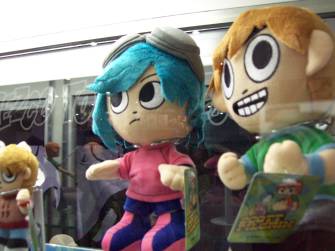 Your Possible Response One: "That Sounds Like A Bit Much. I Think I'm Going To Skip It The Year. That Okay?"
Your Possible Response One: "That Sounds Like A Bit Much. I Think I'm Going To Skip It The Year. That Okay?"
Oh, sure. I think unless you're really focused on going it's probably too big an event at this point to "just attend," even for a day. We'll miss you, and hope to see you in a future year when you're geared up to go. Can I maybe interest you in an
SPX,
WonderCon or
APE in the meantime?
*****
 Your Possible Response Two: "Okay, That All Sounds Awesome. I'm In. So What Do I Need to Do Right Now?"
1. First, make certain you can afford what you're getting into.
Your Possible Response Two: "Okay, That All Sounds Awesome. I'm In. So What Do I Need to Do Right Now?"
1. First, make certain you can afford what you're getting into.
As mentioned, it costs a decent amount to go to Comic-Con International. Air travel, hotels, meals, convention expenses, anything you're planning to buy, incidental costs like cab rides... Don't get caught short. I have a friend that actually stashes away money orders to "pay" for the trip as early as possible. My friend is kind of loopy, mind you, but his thinking is that if he pre-pays for the trip, he'll be happier about going and he'll avoid additional stress that might spoil his weekend. It's difficult to fault his logic.
2. Once you've made the decision to go, register as early as possible.
If you're going as a con attendee -- as opposed to an industry professional or as press -- you can sometimes get discounts for registering for the show before certain dates. More to the point: if you don't register early,
you may not get to at all. Last year's show sold out of four-day passes and then individual passes months before the show began.
If you're an industry professional or a press person, the convention will offer limited windows for registration in the spring. They come up more quickly than you think, and they are
not guaranteed. Make a habit of visiting the Comic-Con site.
3. Bookmark the convention's web site as early on as possible.
Here. It's still the best place for announcements and the like. If nothing else, keep an eye out for 1) their announcement of the day hotel rooms will start being made available through their travel partner (known among longtime con-goers as The Day Of Massive, Soul-Destroying Frustration), 2) registration information by type of admittance sought, and 3) their growing guest list. You really don't have to follow #3, but it's fun.
4. Start thinking about a room.
Because hotel rooms are so expensive, and because so many people want them, a lot of potential attendees make securing a room at Comic-Con a minor hobby on the level of cleaning out the car or shampooing the dogs -- something you look into once a month or so. The convention will provide the opportunity to reserve discount rooms through their site. Getting one on that day or on one of the days immediately after is
extremely competitive, to the point of throwing your laptop into the wall and screaming "I Hate Comics" for three and a half hours. If you can find a room you can live with at any time between the moment you decide to go and the moment you get on the plane, snatch it up!
5. If you're reading this after the New Year and before Memorial Day, make getting a room a major priority.
Many of the rooms are snatched up before the con makes their rooms available, and many of the con rooms are snatched up in the first hour or so upon going on sale. After the con's rooms see their initial sell out at some date early in 2010, take the best rooms you can find as soon as you can find them.
6. Most of all, don't panic on the room thing.
Let me make one thing perfectly clear:
It's not impossible to get a room later in the Spring. Not yet. In 2007, I booked three days at a downtown hotel for myself in May and four days (!) for a friend of mine in June. In 2008 I switched my rooms from the Westgate to the Ivy and then to the Bristol when my schedule shortened twice. In 2009 I was initially shut out of reservations, but ended up with rooms at two excellent hotels within a toss of Thor's hammer from the convention center. In 2010, the new system of "list your favorites"/"get what they give you" actually worked on my behalf and after 45 seconds on the site I got my third choice of hotel. That means I didn't have to look for rooms late in 2010, but I did manage to move two friends from the Hotel Circle and into downtown hotels in mid-June. So while it's difficult to secure a room, and will likely be more difficult than ever in 2011 -- I'm even hearing rumors an increased canceled room charge -- it's not yet impossible.
7. As far as rooms go, keep in mind this general rule.
Closer is better. Certainly that's not always the case. Sometimes a nicer hotel further away is the better choice. I stayed further away this year and
loved it. All other things being equal, however, you want the closest hotel you can find. This is
doubly true if you have things you have to carry back and forth with you each day. Hotels past Broadway going North or hotels going east more than five or six blocks require a mental adjustment, as you will not be able to easily pop back to the room whenever you want. Hotels further away than the highways require a
major mental adjustment and, realistically, a car.
8. Start paying attention to air travel.
Once you're committed, and if you're flying, it sometimes pays to start paying attention to air travel through
your favorite on-line ticket site in order to secure the best prices. As fuel prices fluctuate and airlines cut flights, it can be expensive to fly unless you seek out this kind of bargain.
*****
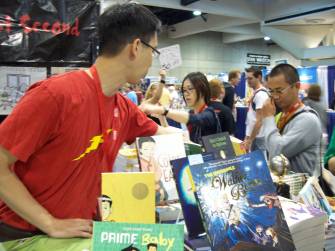 What Are Some Of The Different Ways I Can Arrange A Comic-Con Vacation?
1. The Classic! (Wednesday PM to Sunday PM/Monday AM)
What Are Some Of The Different Ways I Can Arrange A Comic-Con Vacation?
1. The Classic! (Wednesday PM to Sunday PM/Monday AM)
Fly into San Diego on mid-afternoon Wednesday. Go to Preview Night. Attend the con Thursday to Sunday. Leave late Sunday night or early Monday morning. Gorge on comics and pop culture between your first airplane landing and your last airplane leaving. Compare notes with other full convention attendees about what a rigorous enterprise this is.
2. The Hard-Core Industry Touch and Go! (Wednesday PM to Saturday AM)
I like to go in Wednesday and leave Saturday morning while everyone is still reasonably fresh and ready to go and before the weekend's slight shift in emphasis in the direction of blockbusters and big mainstream hits. In 2008 I went for two days and one night (Friday). There's no better way to cut costs than to go on a limited schedule and there's no better way to avoid burnout than to go for one or two days rather than four.
3. The Prime Time! (Friday AM to Sunday Noon)
Actually it's not true that the really big panels are only on Friday and Saturday, not anymore, but you can pretend that's the case and show up for the weekend and act like you're dismissing the preliminaries (Wednesday-Thursday) and the Wind-Down (Sunday afternoon). If you do this one, you're required by con law to tell people that all you did on Sunday is have breakfast and leave. "I didn't even go to the show on Sunday." Having fresh eyes and healthy feet when everyone else is starting to flag can be an advantage as well.
4. The Clowes! (Saturday AM to Saturday PM)
Show up, set up, sell art, shake hands, sell more art, sign autographs, get treated to dinner, leave. I kid, but day trips are a way to cut out a lot of the hassle and still get a chunk of what's fun about the show.
5. The Extended! (Monday AM to Monday PM or Tuesday AM)
A lot of my comics industry friends make a full week out of CCI, heading out on Tuesday before the show and heading home Monday afterward. Going for an extra day allows you the time to more easily enjoy different aspects of the city, enables you to fly in and out on potentially less crowded aircraft, and makes it so that you can relax into the show and decompress after it's done.
This isn't just an option for the rich. I know some very economically-challenged comics publishing employees that have slipped a real vacation on the end of the show by having their company shift the date of their return flight and booking a couple of extra days of hotel rooms at non-convention price levels.
6. The SoCal! (Wednesday and Sunday -- or more -- in Los Angeles; Thursday/Friday/Saturday in San Diego)
For those of you that have friends, family or business in Los Angeles, LAX may offer a cheaper flight destination, and may have better times available, than coming straight into San Diego from your town more than 400 miles away. The commuter flights and AMTRAK options to get to San Diego are plentiful and, all things considered, modestly priced. My brother is in LA, and this is what I did in 2009 and 2010. The thing that's nice about this is if you initially miss out on getting a hotel room you can still commit to your time in Southern California knowing that you can likely stay an extra day up in LA if you have to.
7. The Vegas! (Monday-Tuesday before or after CCI in Las Vegas; Thursday-Sunday in San Diego)
I used to extend my CCI visits by going to Las Vegas, which I think is a perfect place to decompress and relax after a long weekend of walking around and looking at funnybooks.
Okay, I'm kidding: I just sort of like going to Las Vegas.
The two big advantages here are 1) the cheapest days of the Las Vegas hotel week tend to be the Mondays through Wednesdays that fall on either side of Comic-Con, and 2) as is the case with LAX it may be easier to find cheap airfare in and out of Las Vegas -- at much better times -- than what's available from your home airport.
Say you
have to be in San Diego on Wednesday at 3:00 PM to meet with a publisher. You find out the only flight from Indianapolis on Wednesday puts you in San Diego at 6 PM. You
could go to San Diego Tuesday and pay $275 for a hotel and sit around waiting for everyone else to show up.
Or you could go to Las Vegas on Tuesday and stay at the Orleans or the Flamingo for $89 and gamble and see Donny Osmond and eat lobster bisque and then fly out Wednesday morning to San Diego well in advance of your 3:00 PM appointment. Plus you can tell people you
had to go to Vegas to save money, which is funny.
*****
That's it for now. Feel free
.(JavaScript must be enabled to view this email address) if you have specific questions. See you on Memorial Day for the full travel guide!
*****

*****
*****


